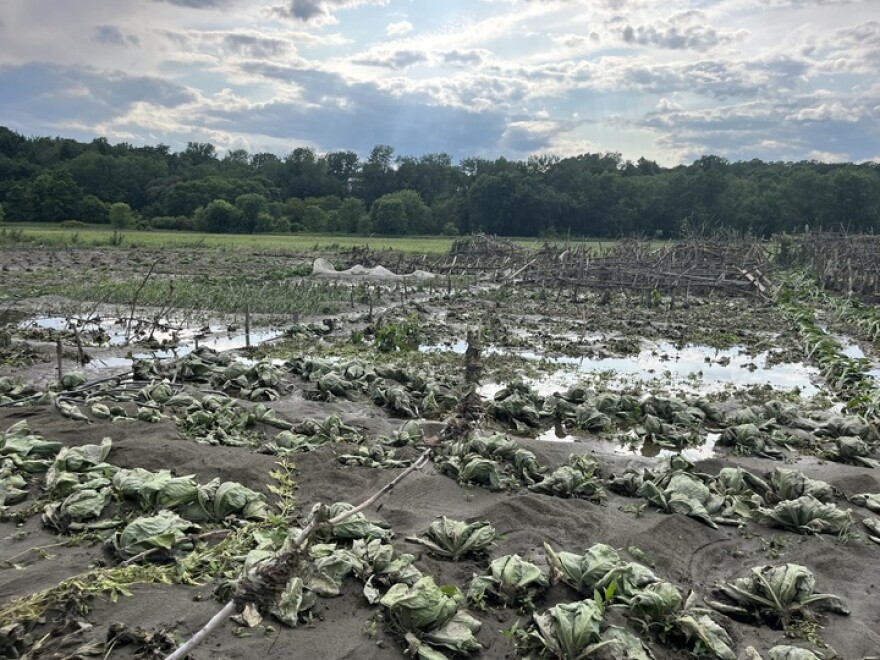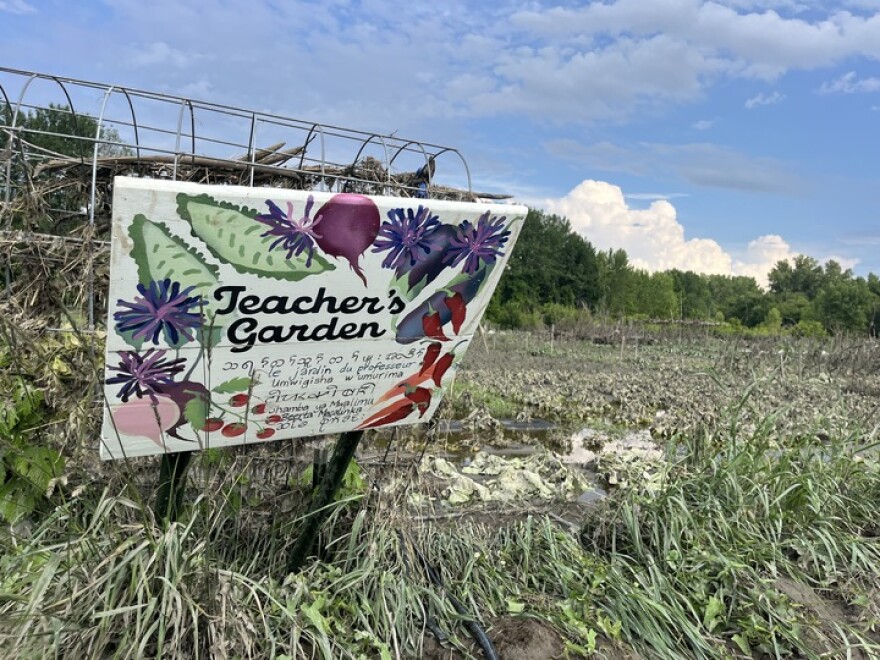When the Winooski River jumped its banks last week, Alisha Laramee had roughly 100 farmers to notify — in five different languages.
Laramee manages New Farms for New Americans, which is part of the Association of Africans Living in Vermont, or AALV. The program has farming space at the Winooski Valley Park District and the Intervale Center — both areas which were flooded.
By last Friday, the water had receded enough for Laramee to finally survey the damage.

Walking through the fields, Laramee stopped periodically to take in the devastation. An intricate homemade trellising system had toppled over, and the medicinal herb garden was slick with muck.
Five feet of water swallowed these fields just as the season’s crops were beginning to really come in.
“Everything grew a foot last week,” Laramee said.
And now, everything will need to be thrown out.

New Farms for New Americans provides families who arrived in Burlington as refugees with plots of land to grow their own culturally significant food. These are crops from their home country that are not available for purchase in the state. Things like African eggplant, snake gourds and roselle.
The program works with farmers from countries including Bhutan, Burma, Burundi, Tanzania and Somalia. Laramee said some of the families have been growing here for 15 years.
“This is where people go with their families to be together, to grow their food, and you know, farm together, and this is relaxing, this is a way of life," she said. "This is what everyone did in their home countries."
More from Vermont Public: A spring evening with a New Farms for New Americans gardening class
Each plot is 25 by 100 feet, and they are important for ensuring the food security of many of the families that farm here. Laramee said one plot, on average, can feed a household for up to 7 months of the year.
“People will eat off of it during the summer, but there's so much time and energy put into saving food for the winter, filling your freezer, your three freezers with tomatoes,” she said.
Among the farmers impacted by the flood is Maya Gurung Subba. She is from Bhutan, and is one of the farm's community leaders. During the school year, she works in the kitchen at Flynn Elementary School. Her family has been farming with the program since 2009.
“This is the first time seeing the flood with my eyes, but 10 or 11 years ago, I only heard the story from my parents,” Gurung Subba said.
When Tropical Storm Irene hit Vermont in 2011, crops here were similarly devastated.
After taking a break due to the damage, her family decided to come back to the farm. She says that it has always been about more than just the food. It is the community that is forged while farming, the joy of being together and sharing time, that brought her family back to the garden.

“It's not only like, gardening and eating vegetables to our family," she said. "It's just like, meeting other new family members here. And then talking about their ways of farming."
This time, Gurung Subba said that she will not be taking a break, and that she is ready to replant when it’s safe to do so.
Before the flood, she had been protecting and growing a bean seed that her Bhutanese relatives gave her. Because of the soil contamination, she said she can no longer use the seeds, but she is hopeful that her relatives in Massachusetts may have more to share.
“You know, what can we do? We can't stop this. It's a natural thing, and I'm glad everybody's safe," she said.
So much of what comes next for the program is still unknown. Laramee says the program will continue under the guidance of Vermont’s Agency of Agriculture and the U.S. Department of Agriculture's Natural Resources Conservation Services.
Early next week, the AALV will receive grant money from the Vermont Community Foundation’s Flood Response and Recovery Fund 2023.
In addition, the Vermont Foodbank is helping to make culturally significant CSA-style food shares available to farmers here affected by the flood.
Laramee said she is deeply appreciative and humbled by the community support. Volunteering opportunities will be posted on the program's Instagram page.
Have questions, comments or tips? Send us a message.
Flood recovery resources
- For state road closure information, visit newengland511.org or follow @511VT on X. (For local road closures, use the Waze app or monitor town communications, such as a website or Facebook page.)
- You can sign up for alerts from the state at vtalert.gov.
- The latest forecasts and water levels for specific rivers are provided by the National Water Prediction Service.
- Find power outage information at vtoutages.org.
- To find more resources and services, and to report flood damage, call Vermont 2-1-1 or visit vermont211.org.
- For a list of state resources and guidance about flooding, visit vermont.gov/flood. The guidance includes returning home after a flood, cleaning up, and dealing with mold.
- Find flood recovery information in multiple languages at vem.vermont.gov/flood/translation.
- To request cleanup help from volunteers and groups, call the Crisis Cleanup hotline at 802-242-2054.
- For mental health support, call 9-8-8 or call or text the SAMHSA Disaster Distress Helpline at 1-800-985-5990.
- To register through the state to volunteer, visit vermont.gov/volunteer.
- If flood waters reached your private well or spring, order a drinking water test kit through the Vermont Department of Health.
- Find flood-prone areas near you with the Vermont Flood Ready Atlas.




